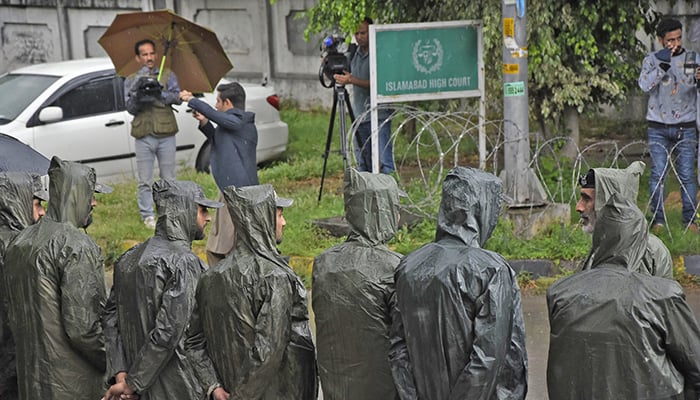All eyes are on the Islamabad High Court (IHC) as it is set to announce a reserved verdict today (Tuesday) on Pakistan Tehreek-e-Insaf (PTI) Chairman Imran Khan’s petition challenging his conviction and sentence awarded to him in the Toshakhana case.
Earlier this month, a district and sessions court in the federal capital had sentenced Khan to a three-year in prison and imposed a fine of Rs100,000, after finding him guilty of corrupt practices related to the state gift repository.
The former prime minister, who has been disqualified from holding any public office due to the conviction, was arrested immediately after the trial court’s ruling and has since been incarcerated in Attock jail.
However, Khan challenged the verdict — which barred him from contesting elections due later this year — in the high court and sought his release and suspension of the conviction.
On Monday, a division bench comprising IHC Chief Justice Aamer Farooq and Justice Tariq Mehmood Jahangiri concluded the proceedings on the plea and reserved the verdict.
The IHC was slated to be announced at 11am; however, the announcement is reportedly facing delay.
Before the conclusion of proceedings, the counsel representing the Election Commission of Pakistan (ECP) Amjad Pervaiz presented his arguments opposing the pleas by the PTI chief.
The PTI has sought the suspension of his conviction by Additional District and Sessions Judge (ADSJ) Humayun Dilawar, and requested the court to declare both the conviction and sentence in the case as illegal.
It also sought the deposed prime minister’s acquittal in the case, contending that the ECP’s complaint against him was inadmissible.
In his arguments supporting the petition, Khan’s counsel Sardar Latif Khan Khosa focused on three aspects — suspension of his client’s short sentence, jurisdictional defect and improper authorisation.
He also objected to the denial of Khan’s right to defence.
However, the electoral body’s lawyer termed the objections to the maintainability of the ECP’s complaint as baseless during Monday’s hearing.
He claimed that the witnesses presented by the defence were not relevant as these were tax consultants, whereas the complainant accused the ex-PM of submitting a false declaration of assets.
He also objected to the request for suspension of Khan’s sentence, saying this is not a matter of right but the discretion of the court which could be exercised judiciously.
Plea moved to avert Khan’s arrest in any case
Ahead of the Toshakhana verdict, the PTI filed a new plea seeking the court’s directive to stop authorities from arresting Khan in any case.
The plea was filed in the IHC by PTI chief’s lawyer Salman Safdar.
The petition filed in the court to restrict the Federal Investigation Agency (FIA), National Accountability Bureau and police from arresting Khan.
What is Toshakhana?
Established in 1974, Toshakhana — a Persian word meaning “treasure house” — is a department under the administrative control of the Cabinet Division and stores precious gifts given to rulers, parliamentarians, bureaucrats and officials by heads of other governments and states and foreign dignitaries as a goodwill gesture.
It has valuables ranging from bulletproof cars, gold-plated souvenirs and expensive paintings to watches, ornaments, rugs and swords.
Under the rules governing Toshakhana, government officials can keep gifts if they have a low worth, while they must pay a dramatically reduced fee to the government for extravagant items.
The case
The Toshakhana has been under a microscope ever since the emergence of the allegations that Khan purchased the gifts he received as prime minister at throwaway rates and sold them off in the open market for staggering profits.
The 70-year-old cricketer-turned-politician was accused of misusing his 2018 to 2022 premiership to buy and sell gifts in state possession that were received during visits abroad and worth more than Rs140 million ($635,000).
The gifts included watches given by a royal family, according to government officials, who have alleged previously that Khan’s aides sold them in Dubai.
Moreover, seven wristwatches, six made by watchmaker Rolex, and the most expensive a “Master Graff limited edition” valued at 85 million Pakistani rupees ($385,000), were also among the gifts.
A reference was forwarded by National Assembly Speaker Raja Pervez Ashraf to the Election Commission asking it to probe the matter.
In October 2022, the electoral body declared the former premier guilty of corrupt practices.
A timeline of Toshakhana case
On October 21, 2022, the ECP maintained that the former prime minister made “false statements and incorrect declarations” about the gifts and disqualified him under Article 63(1)(p) of the Constitution.
Subsequently, the election watchdog moved a sessions court in the federal capital, seeking criminal proceedings against the PTI chief for allegedly misleading the ECP regarding gifts received from foreign dignitaries while he was in office.
The trial court indicted the PTI chairman on May 10 and rejected his petition to declare the case inadmissible.
On July 4, the IHC overturned the trial court’s ruling and directed it to rehear the petitioner and decide the matter within seven days.
On July 8, ADSJ Dilawar declared the Toshakhana case against Khan as maintainable, which was again challenged in the IHC.
During the trial proceedings, Khan’s lawyers also accused the presiding judge of bias on the basis of his Facebook posts and sought the transfer of the case.
On August 2, the trial court rejected the list of witnesses presented by the PTI chairman, stating that he failed to prove their “relevance” in the criminal proceedings against him. It was also challenged in the high court.
However, the PTI chairman again moved the high court seeking a stay and transfer of the case to another court.
On August 4, IHC Chief Farooq referred the matter back to the trial court with a direction to re-examine the jurisdiction and any procedure lapse in the filing of the complaint by the Election Commission.
On August 5, the trial court found the former prime minister guilty of misdeclaration of state gifts.



Comments are closed.